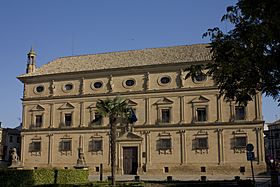Vázquez de Molina Palace facts for kids
Quick facts for kids Vázquez de Molina Palace |
|
|---|---|

Main façade
|
|
| Former names | Palace of the Chaims |
| General information | |
| Type | Palace |
| Architectural style | Renaissance |
| Location | Úbeda, Spain |
| Coordinates | 38°0′28.93″N 3°22′6.48″W / 38.0080361°N 3.3684667°W |
| Current tenants | Town council |
| Construction started | 1546 |
| Completed | 1565 |
| Client | Juan Vázquez de Molina |
| Design and construction | |
| Architect | Andrés de Vandelvira |
The Vázquez de Molina Palace, also known as the Palace of the Chains, is a beautiful old building. You can find it in Vazquez de Molina Square in Úbeda, a city in Spain. It is a great example of Renaissance style. Many people think it is one of the best buildings from that time in all of Spain! Today, this palace is used as the town hall for Úbeda.
How the Palace Was Built
The palace was built a long time ago by a man named Juan Vázquez de Molina. He was an important person who worked for King Philip II. The famous architect Andrés de Vandelvira designed the palace. Construction started in 1546 and finished in 1565.
After Juan Vázquez de Molina died, the palace became a convent. This means it was a home for Dominican nuns. The building was changed to fit their needs. You can still see some old wall paintings in what used to be their meeting room.
In 1837, the government took over many church properties. Because of this, the palace became the City Hall. It has been used for city government ever since.
What the Palace Looks Like
The palace has a special design. It is shaped like a square with a two-story courtyard inside. The front of the palace has three levels. It is also divided into seven tall, narrow sections.
The main front of the palace has many interesting parts:
- There is a main entrance in the middle.
- The windows on the main floor have triangular tops called pediments.
- On the second floor, you can see round windows, like portholes on a ship.
- There are also stone figures of women, called caryatids, holding up parts of the building.
- The roof has a special edge called a cornice that sticks out.
- At the corners of the roof, there are decorative lanterns.
See also
 In Spanish: Palacio de las Cadenas para niños
In Spanish: Palacio de las Cadenas para niños

